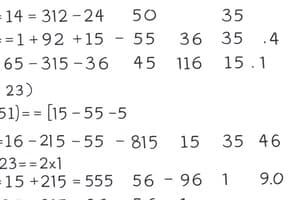Podcast
Questions and Answers
What are real numbers?
What are real numbers?
- Imaginary numbers
- Fractions only
- Numbers like 1, 15.82, −0.1, 3/4 (correct)
- Only integer values
What are rational numbers?
What are rational numbers?
Numbers that can be made by dividing two integers.
What are irrational numbers?
What are irrational numbers?
Real numbers that cannot be made by dividing two integers.
What is an integer?
What is an integer?
What are whole numbers?
What are whole numbers?
What are natural numbers?
What are natural numbers?
What is the additive inverse?
What is the additive inverse?
What is the multiplicative inverse?
What is the multiplicative inverse?
The Commutative Property of Addition states that a + b = b + a.
The Commutative Property of Addition states that a + b = b + a.
The Commutative Property of Multiplication states that (a)(b) = (b)(a).
The Commutative Property of Multiplication states that (a)(b) = (b)(a).
The Associative Property of Addition states that a + (b + c) = (a + b) + c.
The Associative Property of Addition states that a + (b + c) = (a + b) + c.
The Associative Property of Multiplication states that ax(bxc) = (axb)xc.
The Associative Property of Multiplication states that ax(bxc) = (axb)xc.
The Additive Identity Property states that a + 0 = a.
The Additive Identity Property states that a + 0 = a.
The Multiplicative Identity Property states that a x 1 = a.
The Multiplicative Identity Property states that a x 1 = a.
The Additive Inverse Property states that a + -a = 0.
The Additive Inverse Property states that a + -a = 0.
The Multiplicative Inverse Property states that a x (1/a) = a.
The Multiplicative Inverse Property states that a x (1/a) = a.
What is the Distributive Property?
What is the Distributive Property?
What does Absolute Value represent?
What does Absolute Value represent?
What is the point-slope formula?
What is the point-slope formula?
Flashcards are hidden until you start studying
Study Notes
Real Numbers
- Real numbers include all rational and irrational numbers, excluding imaginary numbers.
- Examples of real numbers: 1, -0.1, 15.82, and 3/4.
Rational Numbers
- Rational numbers can be expressed as a fraction of two integers (a/b).
- Examples include 1/2, 0.75, 2, -6.6, and 2.12.
Irrational Numbers
- Irrational numbers cannot be expressed as a fraction of two integers.
- Their decimal representation is infinite and non-repeating, such as π.
Integers
- Integers comprise whole numbers that can be positive, negative, or zero.
- Examples include -1, 0, and 1.
Whole Numbers
- Whole numbers start from zero and include all positive numbers without fractions or decimals.
- The set includes {0, 1, 2, 3, ...}.
Natural Numbers
- Natural numbers are whole numbers starting from 1 and include all positive integers.
- They follow the sequence: 1, 2, 3, ...
Additive Inverse
- The additive inverse of a number is what needs to be added to that number to yield zero.
- For any number 'a', its additive inverse is '-a' (e.g., 3 and -3).
Multiplicative Inverse
- The multiplicative inverse (or reciprocal) of a number is what needs to be multiplied to yield one.
- For a number 'a', the multiplicative inverse is '1/a'.
Properties of Operations
- Commutative Property of Addition: Order does not affect the sum (a + b = b + a).
- Commutative Property of Multiplication: Order does not affect the product (a × b = b × a).
- Associative Property of Addition: The grouping of addends does not affect the sum (a + (b + c) = (a + b) + c).
- Associative Property of Multiplication: The grouping of factors does not affect the product (a × (b × c) = (a × b) × c).
Identity Properties
- Additive Identity Property: Adding zero to a number does not change the number (a + 0 = a).
- Multiplicative Identity Property: Multiplying a number by one does not change the number (a × 1 = a).
Inverse Properties
- Additive Inverse Property: The sum of a number and its additive inverse is zero (a + (-a) = 0).
- Multiplicative Inverse Property: The product of a number and its multiplicative inverse is one (a × (1/a) = 1).
Distributive Property
- The distributive property allows multiplication across addition (a(b + c) = ab + ac).
Absolute Value
- Absolute value measures the distance of a number from zero on the number line, disregarding sign.
Point-Slope Formula
- The point-slope formula is used to define the equation of a line given a point (x1, y1) and a slope (m): y - y1 = m(x - x1).
Studying That Suits You
Use AI to generate personalized quizzes and flashcards to suit your learning preferences.




